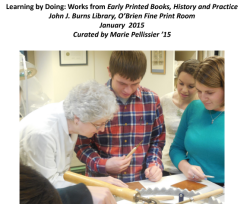Early Printed Books: History and Practice, was taught by Professor Virginia Reinburg, in conjunction with Burns Library Conservator Barbara Adams Hebard, in the fall of 2014. In this small class, students had the opportunity to explore the vast changes that the invention of the printing press brought to Europe around the seminar table with Professor Reinburg. In the conservator’s lab, under the guidance of Ms. Hebard, students had the opportunity to work on projects that helped them understand the physicality of the books in the Burns. Starting with simple techniques and tools, like folding paper to make puzzle purses, the students progressed to more complicated techniques, like sewing and blind tooling, making impressions on leather with hot brass tools. On display are examples of the crafts the students produced: a puzzle purse, the first project in the lab, a paste paper pamphlet, a girdle book, and blind-tooled leather plaquettes. Everyone in the class was able to let their creativity loose on each project, and no two finished pieces looked alike. Marie Pellissier ‘15, curator
Burns Library Exhibit
Four wall cases featuring exhibits highlighting collections in the Burns Library.
Learning by Doing: Works from Early Printed Books, History and Practice
January 2015

Early Printed Books: History and Practice, was taught by Professor Virginia Reinburg, in conjunction with Burns Library Conservator Barbara Adams Hebard, in the fall of 2014. In this small class, students had the opportunity to explore the vast changes that the invention of the printing press brought to Europe around the seminar table with Professor Reinburg. In the conservator’s lab, under the guidance of Ms. Hebard, students had the opportunity to work on projects that helped them understand the physicality of the books in the Burns. Starting with simple techniques and tools, like folding paper to make puzzle purses, the students progressed to more complicated techniques, like sewing and blind tooling, making impressions on leather with hot brass tools. On display are examples of the crafts the students produced: a puzzle purse, the first project in the lab, a paste paper pamphlet, a girdle book, and blind-tooled leather plaquettes. Everyone in the class was able to let their creativity loose on each project, and no two finished pieces looked alike. Marie Pellissier ‘15, curator

